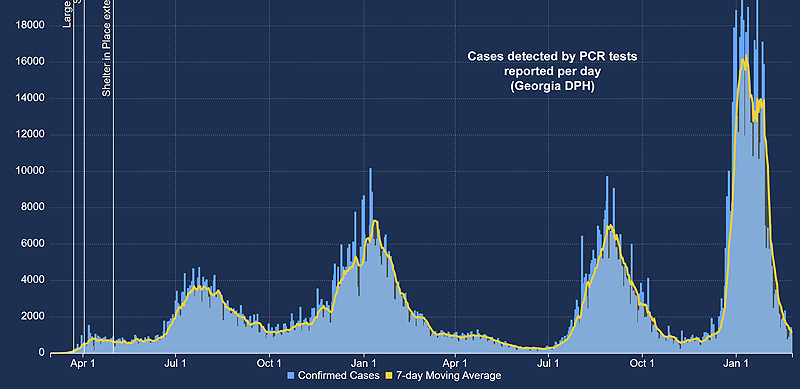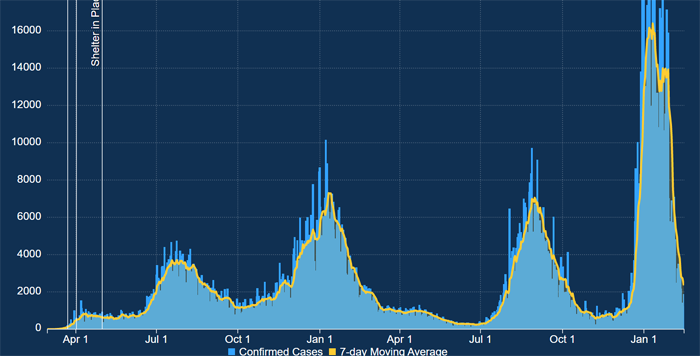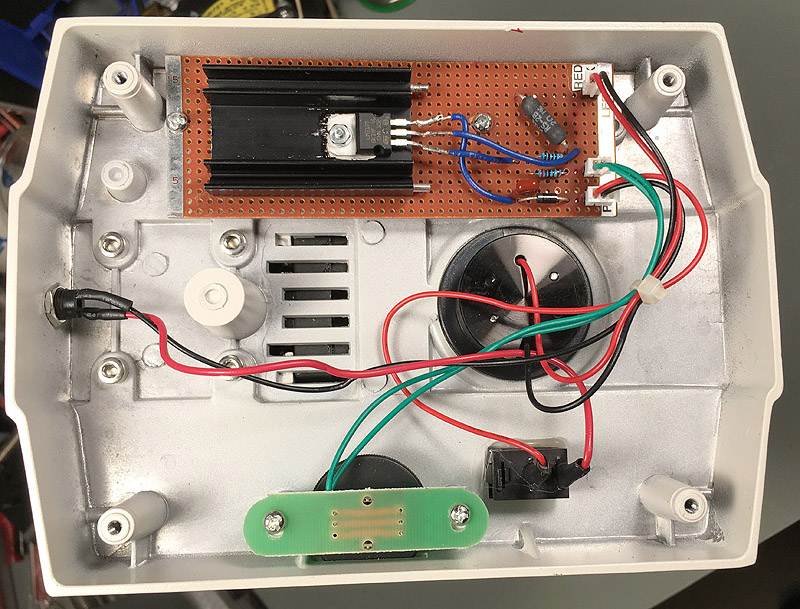2022
February
25
|
Ukraine
Pray for peace in Ukraine.
About the war I will say only two things: (1) an invasion and complete takeover of Ukraine
is not a proportionate response to whatever military threat Putin feels from its participation
in NATO; (2) much of the Russian populace appears to agree with me about that.
Permanent link to this entry
Is it over, this time, maybe?

Our latest and greatest COVID wave wasn't particularly deadly, partly because the virus itself has
mutated into a less serious disease, and partly because of widespread vaccination.
Now the mask recommendations are being lifted, and normal life may be about to resume.
We've been through this before. My thought? Don't stop fighting a fire that is 98% out.
Permanent link to this entry
We survived an Internet outage
At 9:30 a.m. on the 22nd, Internet service to the house suddenly went out, along with the
land-line telephone, which is nowadays VoIP. A little more than three days later, it was
restored. In between, we made do with Internet connections through our cell phones and,
at one end of the house, a
WiFi connection generously shared by a kind neighbor.
The culprit was a bent coaxial cable. When cables were buried after the driveway work in
December, one of them had a sharp bend in it, which apparently gradually got worse because
of the weight of a rock on top of it, and eventually short-circuited.
The cable was shortened and spliced today, and all is well.
Now to deal with the work that piled up while we didn't have a good Internet connection.
In particular, I didn't work out a good way to use cell-phone Internet at the same time
as our LAN, so I put off doing everything that required both at the same time.
Permanent link to this entry
And we survived Truist Bank conversion
This week was also the last step in merging SunTrust Bank with BB&T to make Truist Bank
(not, in my opinion, an inspired name; people misread it as "Trust" and I have heard at least
one person dub it "Triscuit").
The main thing this meant for me was that I had to rework several accounts in Quicken and
dispose of duplicate downloaded transactions as well as, surprisingly, some strangely altered
starting balances (on accounts that already existed at the beginning of this Quicken file).
There is one substantial disappointment. Direct Connect, a.k.a. PC Banking, is no longer
offered. To pay bills electronically, I have to go to the bank's web site and enter the payments,
then remember to enter them into Quicken as a separate operation.
Previously, I could set up payments in Quicken itself.
There are conflicting statements as to whether this service will be offered again soon;
I hope so; without it, Truist isn't competitive.
Permanent link to this entry


|
2022
February
20
|
Christians are not allowed to hate or despise people
Fellow Christians:
The other day I posted about how being a Christian is not about our personal selfish goals or even our personal rights. Today I want to add something.
We Christians are flatly not allowed to despise or hate other people.
At times we must strongly oppose erroneous ideas or evil actions. But we are not allowed to hate people. “Love your enemies,” said Jesus. Does anyone still listen? And most people who disagree with us do not see themselves as our enemies unless we provoke them to it. Let’s not do that.
In recent years a lot of Christians have mistaken their political opinions for teachings of Christ. I have political opinions myself. They are mostly on the conservative side. But I hold them as opinions, not dogmas, and am well aware that some of my brothers and sisters in Christ disagree with them. I know sincere Christians who are sincere socialists. I think they are mistaken about some points of economics, but they are my brothers. And they may know things I don’t about economic conditions affecting people I’m not so familiar with.
It is much easier to understand and follow political movements than to understand and follow Christ. That’s how a lot of people get sidetracked. Because of its emphasis on personal responsibility, Christianity does, in my opinion, have some important points of contact with American conservatism. But it is not the same thing as American conservatism.
Starstruck loyalty to a politician is something we must avoid. People debate whether it is right to “vote for the lesser of two evils” but I think that is the only way we ever vote! If one candidate is slightly more godly than the other, that does not make him God’s anointed. And it certainly does not justify lowering moral standards even slightly in order to “help the right side win.”
We may sometimes support someone strongly enough to work in a campaign, but we need to do it in the spirit of “this candidate is better,” not “the other candidate is unspeakably evil.” We must not be tricked into approving of what is bad on the ground that the alternative is worse. Politicians should always feel that our support of them is hanging by a thread, that we always want them to be better than they are.
This will be controversial, but I think the phrase “culture war” has misled people and needs to be retired. Yes, there is a struggle between godliness and ungodliness going on all the time in all of human culture. And yes, I say very loudly that we need to influence our culture for good. “Be salt and light,” as Jesus expressed it. But He never portrayed it as a war on people, as a reason to view some of them as enemies.
Permanent link to this entry


|
2022
February
17
|
Textual scholarship and misheard song lyrics
[Revised twice.]
On Facebook, my colleague Dan Everett and some other linguists were talking about how
people misheard the lyrics of the Beatles' "I want to hold your hand." Recall that
the song contains the lines:
And when I touch you, I feel happy inside
It's such a feeling that my love
I can't hide
I can't hide
I can't hide
One person insisted that "I can't hide" was "I get had," and many heard it as "I get high."
In the 1960s you couldn't look up lyrics on line.
So the problem was just like what a classical scholar faces when
manuscripts of an ancient work disagree.
The scholar needs to know the language well enough.
"My love I can't hide" is a complete sentence, but its poetic sentence structure
is probably beyond some people's grasp of English.
"I get had" and "I get high" both lose that sentence structure
(no longer connect to "my love").
There is a different sentence structure that is compatible with all 3 readings
of the last three words.
"My love" could be taken as a vocative (a person being spoken to):
"My love, (I tell you) it's such a feeling that..."
So we actually have a grand total of 4 readings:
(1) "It's such a feeling that I can't hide my love."
(Complete sentence, poetic word order.)
(2) "It's such a feeling that I can't hide."
(Separating "my love" as vocative, person addressed.
So why do you want to run and hide? If you mean hide the feeling,
you left out "it.")
(3) "It's such a feeling that I get high."
(Vocative again.
Two problems. "Get high" was not a common phrase in 1963, when the song came out.
And getting high is not the effect of a feeling, it is a feeling.)
(4) "It's such a feeling that I get had."
Neither I nor Dr. Everett can figure out what this might mean.
So (1) wins. It makes the most sense and gives the poet the most
credit for saying something coherent.
And in fact we can confirm that it is correct.
What about the principle of lectio difficilior, the principle that a rare
word is more likely to be misheard as a common word than the other way around?
I would argue that this only kicks in when you have two completely
plausible readings. In this case, we have only one that preserves the sentence
structure. But overuse of lectio difficilior may be what goes on in some
people's heads when they creatively mis-hear song lyrics,
especially if they don't have much confidence in their mastery of poetic language.
They may think anything that
is totally clear to them isn't sophisticated enough.
Permanent link to this entry


|
2022
February
16
|
Still Life with Roses, by Melody

Melody made some art today, taking this picture with her LG smartphone.
The bowls were handmade by her sister, Crystal Holman, ceramicist.
Permanent link to this entry


|
2022
February
15
|
Is the war almost over, or are we just between battles?

We've almost survived the fifth wave of COVID.
What's striking is that although the number of detected cases in Georgia was the highest yet,
the number of deaths was not.
People who have had three vaccine shots (as I have) are reportedly 97 times less likely to die
of COVID than unvaccinated people.
We still can get the virus, but it shows up more like a cold.
Will we have more waves? Probably. How will we respond? I don't know.
Permanent link to this entry


|
2022
February
11
|
Being a Christian is not all about me
[Posted earlier on Facebook.]
When we Christians share our faith, we quite properly tell people about Jesus.
But there's something even more basic that we need to let people know,
as groundwork, to head off a whole set of misunderstandings.
The key point: It's not all about me.
I am not the center of my universe.
I don't pray and meditate to achieve my personal goals.
I want to find out what is actually wise and good, and seek those things.
Of course I can't hide the fact that I live by a moral code, but I am not here to show people how good I am.
I am well aware that I am not good enough.
I am seeking good that is outside myself.
I am not here to pile up karma points or engage in virtue-signaling.
I don't believe in karma, I believe in mercy.
When I make a minor sacrifice for someone else, it's not to prove anything to them or to myself.
It's because it's a good thing to do.
My morality does not revolve around "my rights."
I have rights under the law, of course, because that's how laws work,
and I advocate fair laws, but my own rights are not what I'm focused on.
Being good to others, and finding what is genuinely good for myself, is my focus.
I need to think more about how to convey this to a secular audience.
Sincere adherents of quite a few other religions and secular philosophies would agree with it.
But many of the voices that we hear on social media would not.
Permanent link to this entry


|
2022
February
9
|
Java is free again
You may be getting Java update notices saying that the license is changing to prohibit
commercial use.
Or you may have switched to OpenJDK a while back.
Good news: Genuine Oracle JDK is free again.
(I thank Erik Benner for this information.)
But it is not the version you'll get through updates.
Instead, uninstall Java and
install the version here
(be sure to choose the tab for your operating system).
If you installed OpenJDK, which did not have an installer, then you will
need to delete its folder under C:\Program Files\Java, and also remove
references to it from the system environment variables.
Basically, undo the steps described at this link.
Permanent link to this entry
Not everything in 1970s music was terribly important
[Revised.]
I've been coming across (not watching) YouTube videos and other web sites that point out one
development after another in 1970s rock music and claim that every development was very important.
Let's get some perspective.
Because of the way the mass media worked in the early 1970s, it was not uncommon to get
enormous audiences for things that weren't all that good.
Thus, not everything that got a huge audience was actually a major development.
I've mentioned something related to this
in connection with TV already.
Back when most people had only two or three TV channels, and one or two radio stations,
any musician that gained prominence would have, briefly, a very large market share.
A musician was either very famous or almost unknown.
[Addendum:]
Remember also that "top songs" were those that sold well to a non-expert audience —
not songs judged good or great by experts — and
many of the records and tapes were bought by people who had
never heard the whole song very well before making the purchase.
AM radio was often overheard in settings where you couldn't give it your full attention,
and the audio fidelity was poor, and it was easy to like part of a song without
realizing there was another part you didn't like so well.
An example is "The Piña Colada Song," about which I'll write more later.
The middle part of that song is romantic — the whole thing, creepy.
In the late 1970s, FM radio and cable TV proliferated, people listened to tapes in their cars,
and everyone had a lot more choices.
I know there was a lot of creativity in the early 1970s,
but I don't think popularity in the early 1970s can be compared directly against
popularity later.
It was a different environment.
Permanent link to this entry


|
2022
February
6
|
An ancient Hebrew popular song?
While reading the 23rd chapter of Isaiah today, I noticed that it quotes
what is apparently a popular song. Here are verses 15 and 16:
In that day Tyre will be forgotten for seventy years,
like the days of one king.
At the end of seventy years, it will happen to Tyre
as in the song of the prostitute:
“Take a harp;
go about the city,
O forgotten prostitute!
Make sweet melody;
sing many songs,
that you may be remembered.”
From The ESV® Bible (The Holy Bible, English Standard Version®), copyright © 2001 by Crossway,
a publishing ministry of Good News Publishers. Used by permission. All rights reserved.
I haven't done any research on this, but a friend who is a biblical scholar tells me
I'm not the first to believe it's a popular song.
One can almost imagine someone in Nashville singing about what happens
to a prostitute when she gets too old. It has a twang to it.
What I did do is look at the Hebrew, and I was mildly surprised.
Here's the song (from Mechon-Mamre.org)
(at least if your browser can display Hebrew):
|
קְחִי כִנּוֹר סֹבִּי עִיר
זוֹנָה נִשְׁכָּחָה
הֵיטִיבִי נַגֵּן הַרְבִּי-שִׁיר
לְמַעַן תִּזָּכֵרִי
|
Here's a transcription into our alphabet
(in a style close to that of SBL, not the opinions about Hebrew phonology
that I expressed here five years ago):
qĕḥî kinnôr sōbî ʿîr
zônâ niškāḥâ
hêṭîbî naggen harbî šîr
lĕmaʿan tizzākērî
To my ear, this is distinctly more like a modern song than ancient Hebrew
poetry normally is (even the Psalms).
There is very tight structural parallelism,
a near (not perfect) match in number of syllables from one couplet to the next,
and even a rhyme.
Permanent link to this entry


|
2022
February
5
|
OMAX microscope electronic re-engineering

A friend's OMAX microscope, similar but not identical to the one in the picture,
stopped working when the wrong power supply was connected to it.
(That is, the illuminator stopped working; obviously the optics weren't affected.)
This is apparently a common problem, as this microscope requires 5 volts (uncommon) and
isn't protected against incorrect voltage and polarity.
Other discussions of how to fix it are
here and
here.
Like the author of those posts, I decided that rather than fix the original, damaged circuitry,
I would completely re-engineer it to be tolerant of a wide variety of power supplies.
In place of the original switching regulator, which was small and lightweight but
electrically fragile, I came up with this circuit, which might be a 1980s throwback but
really does the job:

It tolerates power supplies up to 35 V, although voltages over 12 V will send it into thermal
shutdown after just a few minutes of operation. It is protected against reverse polarity.
It even works if you supply it AC (under 25 V or so), though it might flicker.
And my circuit board is much bulkier than the original one, though it still fits.
Here you see the new circuit board, and then (closer up) the much smaller original one:


Permanent link to this entry
Farewell to an Athens landmark, or maybe two
The Athens, Georgia, Holiday Inn will not reopen after the pandemic; it is
going to be torn down. Newspaper coverage here.
I stayed there with my family in 1967 when we were thinking of moving to Athens
and in 1973 when we were actually moving here, and in between, in 1971 on a Valwood basketball trip.
Built around 1965, it was the only good hotel in downtown Athens at the time, as best I remember.
Now it is greatly outnumbered by newer hotels both higher and lower on the price scale,
all around it.

Photographed 2022 March 27. Demolition started in early April.
We may also be about to lose Georgia Square Mall (vintage 1981), which is nearly defunct
but still open. A redevelopment plan has been proposed, but I have not heard whether it will go
forward. Malls are a good example of overfitting — they are ideal for one thing but
can't be used for anything else. When you no longer need that thing, they are useless.
Permanent link to this entry


|
2022
February
1
|
School overcrowding in Valdosta, 1971-72
[Revised.]
Fifty years ago today was one of the events I am most thankful for in my youth.
I was just over halfway through tenth grade, and
my longsuffering mother arranged for me to transfer back to Valwood School
(where I had been for ninth grade) from Valdosta High School (VHS), which was
in an overcrowded and troubled state.
Some of what I know about how to run educational programs — knowledge
I have put to good use as an educator — came from seeing how things can
go wrong. With that in mind, I want to describe my bad experience at VHS.
As best I understand it, Valdosta held off desegregating its schools until the
last moment, and then dealt with the high school by abolishing the traditionally
black school altogether, putting all ninth-graders on its campus, and putting
all tenth-, eleventh-, and twelfth-graders on the Valdosta High School campus.
This resulted in a very strong football team (which was voted national champion)
but also a very overcrowded school building, and the overcrowding
disproportionately impacted tenth-graders. For example, as a tenth-grader,
I had one third of a small locker, which I didn't use because I could rarely get to it,
while as far as I know, eleventh- and twelfth-graders had lockers of the normal kind.
I have great respect for old friends who had a better experience at Valdosta High School.
I can only say that several things came together to make that school give me its worst.
I was there at exactly the wrong time and wrong grade level.
The shock wave from combining two schools was, at the time, squeezing exactly the class I was in.
It had been a better school a year earlier.
And one year later, the overcrowding was relieved by a new building.
And I must emphasize that the students were congenial. That was the best thing about VHS.
The large size of the school, and the way people had been thrown together suddenly,
meant that no specific group could dominate the school. People mixed freely.
What were the classes like? I was in a superb mathematics class — one of the
best-taught courses I've ever encountered anywhere — but it was an eleventh-grade
course. On the tenth-grade level, I had world history and Latin courses that were serviceable,
a chemistry course with a good teacher but no lab, and a conspicuously weak English course.
It was team-taught by two young teachers handling 60 to 65 students in a large classroom.
The content was what I would call seventh-grade level — hardly any literary classics,
mostly short stories, with tests, not on how to interpret the stories or
how they were constructed, but on the names of characters, and even their dogs
and cats. These were all "4-level" courses, for the top academic stratum of the school;
there were of course lower-powered 3, 2, and 1-level courses for people who might not
be college-bound.
A lot of people's view of the school was so skewed by football fandom that they
didn't see, and scolded me if I tried to mention, any of the school's weaknesses.
It had apparently been a much better school a short time earlier,
and still was in the parts not so affected by overcrowding.
VHS struck me as remarkably bureaucratic and authoritarian, as if the administration viewed all
the students as adversaries. Which may be true — they may have had a racial
powderkeg about to explode, and I think they were using football mania to keep
it from exploding. Not being a big sports fan, I was an immediate misfit.
That football team, by the way, had not lost a single game in six years.
The town took this as the mark of true excellence. I felt it was a bit unsporting
or even suspicious. Of course, one wasn't allowed to say so.
On my final day, I had to go through a withdrawal process that involved getting all of
my teachers to sign paperwork, one by one. This involved some nearly impossible
rushing around during class changes, through crowds so thick that one could not get from
point to point in the time available. And during it all, I came down with the
worst headache I've ever had, and I had to go home sick. I had been having these
headaches with some regularity, and today Melody suggested something I never thought
about — that it might have been some chemical contaminant
in the school building. At the time I thought it was stress.
On the morning of February 1, I turned up at Valwood, went through enrollment quickly in
the school office, and went to classes. I was glad to be back in an English class more
focused on great literature. In chemistry class, which had the same textbook,
I was given extra time to do the labs that I had missed at VHS. Latin and world history
were much the same as at VHS, which was fine with me. The mathematics class was
lower-powered, but it served its purpose. And I never had any more headaches.
I have never had more than a mild headache for fifty years now.
[Addendum:] In talking about this with old friends, I've realized that many people
were less distressed by the sad state of VHS because they already considered themselves
firmly part of the school and viewed the overcrowding as a brief crisis that the
school would ride out.
I had no prior commitment to VHS and had no confidence that
the new building would open on time or that the school would be well run when it did.
The super-overcrowded VHS was the only VHS I had ever seen.
[Addendum:] I've come across hopeful indications that my departure was something of a
wake-up call for the faculty and administration, and that worthwhile changes began soon
afterward. On the day I left, I finally got the ear of one of the more experienced
counselors (normally available only to eleventh- and twelfth-graders), who listened
sympathetically instead of chiding me for lack of school spirit. I may have made at
least a ripple.
[Addendum:] What was soul-destroying about my VHS experience was that
none of the faculty or administrators would admit they were having any trouble.
We were basically not allowed to say anything negative about the school.
(I think they were trying to hide the school's problems from the public — I've
seen this done elsewhere.)
If someone in authority had just been willing to admit that the school wasn't
functioning very well, and that they were trying to improve it, that
would have made all the difference.
What I have learned as an educator, and taken to heart ever since, is this:
Never rest on your laurels; never be proud of your weaknesses.
If you think you're doing tolerably well, you're probably fine.
If you think you've achieved excellence, and that all your
quirks are strengths, you're about to go through the floor.
Permanent link to this entry


|












